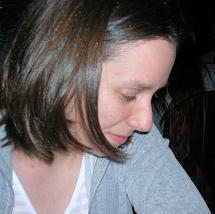Friday, March 19, 2004
Thoughts on East of Eden
I don't quite know how to even summarize this book. It really is the story of one man's life--but it's a sprawling story. It follows the life story of Adam Trask and his family, and interweaves the stories of the people who shape Adam and his children throughout their lives. Can I just say--if you're gonna read it, don't read the reviews on Amazon that give a synopsis of the main events in the book!! Grrr. (That's what you get when you click on the Oprah's Book Club version of the title...not the only reason I link elsewhere...) I went into my reading having heard people say they'd really enjoyed the book, but not knowing much about it. And really, that's enough. There's not a huge plot hook to draw you in, but East of Eden is a really, really good book.
What stands out to me is the way the main characters are so fully developed. Yet Steinbeck does this so slowly throughout the course of the narrative, that I didn't think about it until I finished the book and realized how well I knew each of the characters. I loved so many of them--Lee, Adam, Aron, Abra, Cal. Often, I was frustrated with them and yet I felt like I loved and understood them at the same time. There are so many parallels in the family relationships--between brothers and fathers and sons--and yet each relationship is very much distinct and different.
Anna (one of our assistant editors) asked me if it was depressing...classic question for a Steinbeck novel...and I have to say no very emphatically. If I gave a run-down of some of the many horrible things that happen throughout the novel, I guess you might think it was depressing, but the book is by no means heavy in tone. I felt like it was overwhelmingly hopeful.
Yes, there are parallels to be made between the generations of Adam's family and the family of the biblical Adam...there are themes of good and evil...but what interested me the most was the recurring idea of growth, formation, and influence--who and what a man can become, and why. "Timshel--thou mayest!"
What stands out to me is the way the main characters are so fully developed. Yet Steinbeck does this so slowly throughout the course of the narrative, that I didn't think about it until I finished the book and realized how well I knew each of the characters. I loved so many of them--Lee, Adam, Aron, Abra, Cal. Often, I was frustrated with them and yet I felt like I loved and understood them at the same time. There are so many parallels in the family relationships--between brothers and fathers and sons--and yet each relationship is very much distinct and different.
Anna (one of our assistant editors) asked me if it was depressing...classic question for a Steinbeck novel...and I have to say no very emphatically. If I gave a run-down of some of the many horrible things that happen throughout the novel, I guess you might think it was depressing, but the book is by no means heavy in tone. I felt like it was overwhelmingly hopeful.
Yes, there are parallels to be made between the generations of Adam's family and the family of the biblical Adam...there are themes of good and evil...but what interested me the most was the recurring idea of growth, formation, and influence--who and what a man can become, and why. "Timshel--thou mayest!"
| posted by Barbara | 12:27 AM
